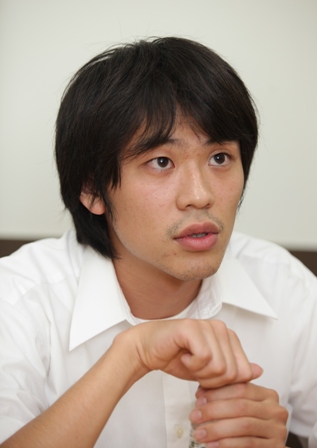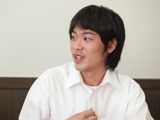Japanese Eyes “No Reply” Interview with Satoru Hirohara (Director)

Satoru Hirohara’s debut feature, “No Reply” won the Dragons & Tigers Award for Young Cinema at the Vancouver International Film Festival last year. His new film “No Reply” is a bittersweet meditation on the ups and downs of Yu and Mike, a 20-something couple. We sat and talked about the film, the creative process and how Hirohara sees himself as a voice from a new generation of filmmakers.
—Your previous film “Good Morning to the World!!” talks about high school students. This film talks about 20-somethings. Are you documenting your own life and generation as you make your films. Is this your project?
Satoru Hirohara (Hirohara): When I make films I always imagine my own generation as my audience. As I should grow and as my films should grow, I guess this should happen. Actually the protagonist of my next film is about 30.
—Are you making a big statement about your generation, or are you concentrating just on interesting stories?
Hirohara: Within myself these two things aren’t separate. They’re different sides of the same coin. And it’s not as if I have a clear message to my generation. In fact, the fact that there is nothing clear is one important theme surrounding our generation. However there is a concept that when you’re growing into an adult you have to make your position clear – that you’re for an idea or against and idea – but I’m both afraid of going there as well as feeling hesitant about it, because I feel we shouldn’t jump into it but should think more by staying where we are. It’s a struggle and that’s how I was feeling as I made this film.
—Could you tell me about your influences, teachers and films that are important for your filmmaking?
Hirohara: There are many people and many films that gave me support and influenced me, but if I’m to choose one in particular at the early stage of my journey I came across a film called “Eureka” by Aoyama Shinji and that really really moved me and I felt there are so many things I don’t know about films and there must be something, some great depth to films that I’d never thought about or never realized. I don’t know what that is but it looked incredible. That’s how I was influenced by him.
—Let’s talk about “No Reply.” I think in Japanese, it’s “No Need to Reply.”
Hirohara: You’re right. The correct translation is “no need to reply’ but somehow “No Reply” sounded cooler.
—The main characters, Yu and Mike, are formless. They don’t seem to know what they’re doing. They often play games. Some are meaningless, some have more intent. Can you talk about playing games?
Hirohara: Well, rather than playing games, when it comes to these two characters, I would call it more like trying to get attention from each other, or trying to communicate. And they do play games, as in trying to make music, etc. but that could be a form of killing time for them, and maybe that’s all they could do, if you look at it critically. And at the very end that takes a shape. It may not have sounded like music to some people, but in my mind it was the music, a form of expression that takes shape at the end.
—This relationship looks like it’s falling apart. It’s very difficult. In your imagination will this relationship end or continue?
Hirohara: Ah, that’s difficult. When I made the film, I felt that this is what they have to go through in order to separate properly. And at the end they would go separate ways, each in their own way, and that’s how I made the film. But when I watched the film on screen today, I thought maybe their relationship would continue. When Yu come backs to pick up her stuff maybe they will decide to try again. And that’s how I’ve been thinking about it recently. They’ll take the next step. Today I was imagining her being pregnant and making a sequel to it. Then the man could say, “Is that really my child?” And the woman would say, “What makes you say things like that?” and they’ll have another argument.

—The characters look very similar – similar faces, the same haircuts. In fact, I sometimes confused them on screen. They don’t seem to have a sexual relationship, they just fight. They almost seem like brother and sister.
Hirohara: As soon as the film starts you see them fighting. But in order to express the fact that they have been in a relationship for a long, I made them look similar, as in the case of a married couple who’ve been together for a long time. Also the roles are kind of merged together.
—Mike, he records noises, but by the end of the film it comes together into a song. Is there an analogy to your own filmmaking method? Is this how you create your films?
Hirohara: I think you’re absolutely right. There is an analogy. Yes, at the end of the film you hear a song that includes all kinds of sounds you’ve already heard, including the recorder – played by her, and the noises that he was making, opening and shutting of the windows and so on, and all of that came together and turned into a song. That’s what I wanted to do most with this film.
—Are Yu and Mike based on people you know? Are they total fiction? Their situation – is it something you know about or something you’ve made up?
Hirohara: I never throw eggs at others (laughs), however I’ve taken lots of clues from my own experiences as well as things my friends told me. Of course in real life you hold yourself back more, but as this is a film, I didn’t do that – either with my own feelings or their actions toward each other.
—Yu seems to take on more responsibility. She’s in and out of love with Mike. He seems quite irresponsible all the time.
Hirohara: It’s difficult. I don’t know if I see like that. It’s true, they’re looking for different things. Where did you think Yu was more responsible?
—She tries to start conversation. She takes actions, even if it’s only leaving. She seems to have a better job, something that may be a career.
Hirohara: Well, he may appear irresponsible. That’s true. But from a kinder perspective, you might say he’s more in love with her than she is with him. To him, she’s everything. That’s all he can see. Whereas she wants to go onto the next step.
—When she escapes. He chases her down the street. The song in the background is Yuuyake Koyake. Was this on purpose?
Hirohara: Yes, it was on purpose. We recorded it later. I like that song. In many municipalities that song is played on loudspeakers precisely at 5 pm. Well, things happen between the two and that propels the whole film, but I wanted to show the audience things that happen outside their relationship. The evening came. It’s 5 o’clock.
—It’s the song is for the children to go home.
Hirohara: Yes, for sure.
Interviewed by Nicholas Vroman (Film writer)
No Reply












